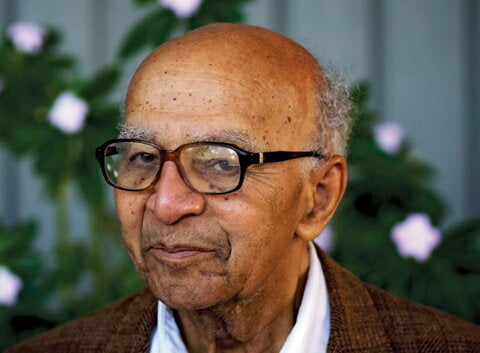
David Blackwell had a distinguished career while living an extraordinary life. Against the backdrop of the Great Depression, World War II, the Cold War, and the Civil Rights Era, Blackwell’s life is one of inspiration. From the very beginning, Blackwell overcame insurmountable odds to become an influential contributor to the world of mathematics and statistics. Blackwell's journey started in Southern Illinois with modest yet noble goals of becoming an elementary school teacher. His remarkable life would culminate with twelve honorary Doctorates and numerous awards, honors, and leadership roles throughout his career.
Blackwell came from humble beginnings to being one of the most influential figures in the field of statistics. Born April 24, 1919 to a homemaker and an Illinois Central Railroad worker in Centralia, IL, David H. Blackwell would become the first African-American to receive a Ph.D. in Mathematics from the University of Illinois Urbana-Champaign, seventh overall in the United States (Agwu, Smith, & Barry, 2003).
Advancing twice to higher-grade levels during elementary school, Blackwell graduated from high school at the age of sixteen. In a time of segregation with mostly whites-only schools or black-only schools, Blackwell went to an integrated mixed school where he was unaware of a lot of the racial discrimination that was plaguing the country at that time. It was in a high school geometry class that Blackwell discovered his passion for mathematics.
“Until a year after I finished calculus, it was the only course I had that made me see that mathematics is really beautiful and full of ideas,” – Blackwell, regarding his high school geometry course (Agwu, Smith, & Barry, 2003).
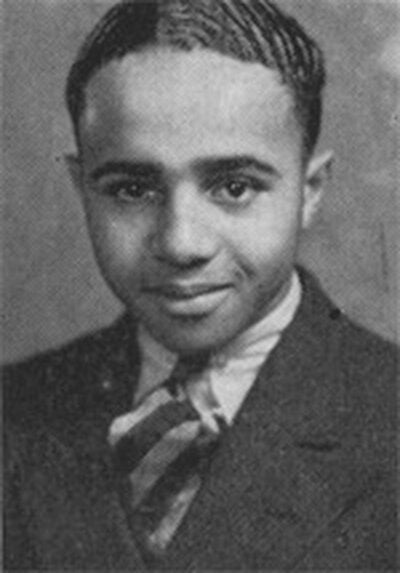

With goals to become an elementary educator, Blackwell enrolled at the University of Illinois Urbana-Champaign in 1935. Even with a four-year scholarship from the state of Illinois, Blackwell worked as a dishwasher, waiter, and a laboratory cleaner to try to spare his family financial burden for the costs of his education. (Albers, 2008) It was during his junior/senior years that Blackwell decided to pursue a graduate degree as he had now set his sights on teaching in higher education. Blackwell completed his B.A. in Mathematics by 1938 and subsequently completed his M.A. by 1939. In 1941, under the tutelage of Professor Joseph L. Doob of Mathematics, Blackwell completed his dissertation titled “Some Properties of Markov’s Chains”.
“No, I cannot come, but I have some good students, and Blackwell is the best. But of course he is black. And in spite of the fact that we are in a war that’s advancing the cause of democracy, it may not have spread throughout our own land.”- Joseph Doob, 1942, in response to Jerzy Neyman of the University of California Berkeley attempting to recruit Doob for UC-Berkeley’s Mathematics Department (Mathematical People: Profiles and Interviews, 1985) (Cattau, 2010).
An illustrious career as an educator, researcher, and statistician would follow Blackwell’s graduation from the University of Illinois, but not without racial discrimination serving as temporary roadblocks along the way. The guidance of Professor Doob helped Blackwell secure the Rosenwald Fellowship at the Institute of Advanced Study (IAS). At that time, it was customary for IAS members to receive visiting fellow appointments from the nearby Princeton University. However, due to racial discrimination, Princeton objected to Blackwell’s appointment and did not allow him to attend lectures or conduct research at the university (Hunter, 2010). The president of Princeton even got involved in the controversy as they felt the IAS was abusing the university’s hospitality by admitting a black man. The university later withdrew their objection upon the insistence of the IAS director and his thesis advisor, Joseph Doob to allow Blackwell to maintain his fellow and courtesy title of assistant professor (Agwu, Smith, & Barry, 2003) (Grimes, William, 2010) (Kehoe, 2015). Blackwell would remain unaware of the internal struggles between Princeton and the IAS for many years. He finished his first year at the IAS making connections that would lead to a lifetime of groundbreaking contributions to the world of statistics.
While working at the IAS, Blackwell worked with John von Neumann, considered the father of modern game theory. Von Neumann had requested a meeting with Blackwell to discuss his college dissertation, but Blackwell wrote off the renowned mathematician’s request. Naively, he did not believe von Neumann was truly interested in mentoring students or hearing about his dissertation. During this time of avoiding a meeting with von Neumann, Blackwell would audit a course taught by world-renowned mathematician, Samuel Wilks. Known for his work in developing the field of mathematical statistics, Wilks would be a founding member of the Institute of Mathematical Statistics (IMS). Eventually, Blackwell would follow through on von Neumann’s request for a meeting to sit down and discuss his thesis on Markov Chains.
"He (von Neumann) listened to me talk about this rather obscure subject and in ten minutes he knew more about it than I did,” – Blackwell on von Neumann (Krantz, 2005).
This interaction with von Neumann would shape a young Blackwell to realize that the elder mathematician’s willingness to continue to mentor students, even at an advanced professional stage, is a model behavior to follow. This is something Blackwell emulated throughout his proceeding career as evident with being the dissertation advisor to over 50 students during his educator career.
After leaving the IAS, Blackwell applied for faculty positions across the country, expecting only to get offers from Historically Black Colleges and Universities. After 105 applications to HBCUs, only 3 offers came in 1942, Blackwell began his educator career at Southern University at Baton Rouge from 1942-43 and followed by a year at Clark College in Atlanta, GA from 1943-44. Blackwell had hoped to get an offer from UC-Berkeley in 1942, but the offer never came (Cattau, 2010). In 1944, Blackwell secured a position at Howard University in Washington D.C. He remained there for the following 10-years until 1954. Starting his career at Howard University as an Assistant Professor, by 1947 Blackwell would have the position of Professor and Chairman of the Mathematics Department.
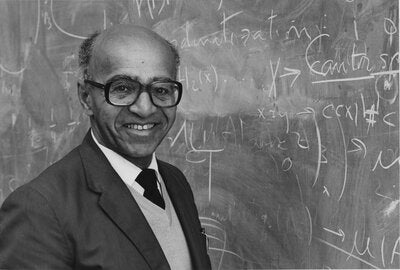
During the summers of 1948-50, Blackwell would work as a mathematician at the RAND Corp. as he sought external mathematical stimulation away from Howard University. There, Blackwell would work alongside statistician Abe Girshick. Blackwell had first encountered Girshick at an American Statistical Association meeting in Washington. Girshick had given a lecture on sequential analysis and Wald’s equation, which challenged Blackwell. This talk would be what sparked Blackwell’s interest in statistics (Albers, 2008). After the lecture, Blackwell constructed a counter-example of Wald’s equation and mailed it to Girshick. Though Blackwell’s example proved wrong, this prompted Girshick to invite Blackwell to meet with him. This meeting would spark a lasting friendship and comradery that would propel Blackwell’s career to new heights and usher him to the world stage of mathematical statistics.
While at the RAND Corp. Blackwell began to work in the field of game theory. Blackwell and Girshick started on the theory of duels – or the duelist’s dilemma –, which involves any two-person, zero-sum game, such as a traditional duel with firearms, a playground game of rock-paper-scissors, or even a game of checkers. One of Blackwell’s achievements was connecting the idea that topology and game theory could go hand-in-hand through a game-theoretic proof of the Kuratowski Reduction Theorem. Blackwell would only briefly look beyond zero-sum games by exploring the sure thing principle, which was an idea brought forth by another of Blackwell’s mentors at the RAND Corp., Jimmie Savage. Blackwell’s moral fiber as a scientist put an end to this further research of the sure thing principle in part because of the negative aspect the mathematical response may have on social, psychological, or economical outcomes. With the arms race of the Cold War looming, the sure thing principle was on display between the United States and the Soviet Union having to choose between either further arming or disarming against not knowing what the enemy was doing (Agwu, Smith, & Barry, 2003).
“I started working on the particular game where the sure thing principle led to behavior that was not best. So, I stopped working on it,” – Blackwell (Agwu, Smith, & Barry, 2003).
After a discussion about the Air Force research budget with an economist at the RAND Corp. that did not go well, Blackwell sought out the guidance of Savage. The conversation with Savage opened Blackwell’s perception to a completely new view on statistical inference – the Bayesian approach. From this point on, the Bayesian approach would influence Blackwell’s work going forward.
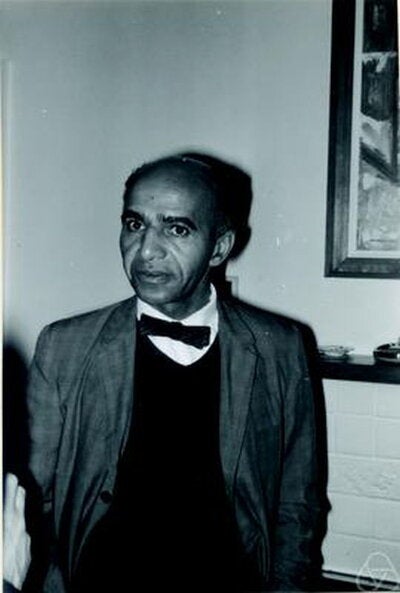
Nineteen fifty four would be a pivotal year for Blackwell. It was this year that Blackwell’s friendship with Girshick culminated with them releasing their collaborated efforts in the form of the now classic book, Theory of Games and Statistical Decisions. Their book explored statistical evaluating procedures through decisions and game theory. It was also in 1954 that Blackwell accepted a position as a visiting professor at the University of California, Berkeley. At the International Congress of Mathematicians in Amsterdam during 1954, Blackwell gave an invited talk on probability that led to UC-Berkeley’s interest in hiring Blackwell.
Blackwell had previously interviewed at UC-Berkeley back in 1942, but did not secure a position under the guise of the department wanting to hire a woman due to wartime efforts (Agwu, Smith, & Barry, 2003). Blackwell would later in his career find out the then head of the math department’s wife protested Blackwell’s hiring. It was customary to host faculty members in their home and the wife objected to hosting a black man in her house.
“-- was not going to have that darky in her house,” – Blackwell recalled what he learned years later of what the wife of the UC-Berkeley’s Mathematics Department Head told her husband upon hearing about Blackwell possibly being hired in 1942 (St. Louis Post-Dispatch, 2010) (Cattau, 2010).
As the Civil Rights era began to unfold in the United States, Blackwell began his tenure at UC-Berkeley, where he befriended Dr. Jerzy Neyman, the Mathematics Department Chair who interviewed him twelve years prior. Headed up by Neyman, the Statistics Laboratory separated from the Mathematics Department in 1955. It was also in 1955 that Blackwell received a promotion to full professorship in the newly formed Statistics Department. By 1956, Blackwell became Chair of the UC-Berkeley Statistics Department. Blackwell served as Chair of the Statistics Department until 1961 and continued his career at Berkeley until his retirement in 1988. Between 1964 and 1975, Blackwell served in various roles while still maintaining his research and teaching fulltime. From 1964-68, Blackwell served as the Assistant Dean of the College of Letters and Science and from 1973-75 served as Director of the University of California Study Center for the United Kingdom and Ireland (Agwu, Smith, & Barry, 2003) (Hunter, 2010) (Grimes, William, 2010).
“People have different learning styles, abstract, concrete, visual, hearing, spatial, and so on. So it is necessary for teachers to reflect these learning styles in their teaching if they would like their students to appreciate the beauty of what they are teaching,” – Blackwell on reflecting on his style of teaching (Agwu, Smith, & Barry, 2003).
With the premise of incorporating new evidence instead of relying on historical data, Blackwell’s book “Basic Statistics” (1969) was one of the first textbooks on Bayesian statistics (Grimes, William, 2010). This inspired the 1995 textbook by biostatistician Donald Berry, “Statistics: A Bayesian Perspective”.
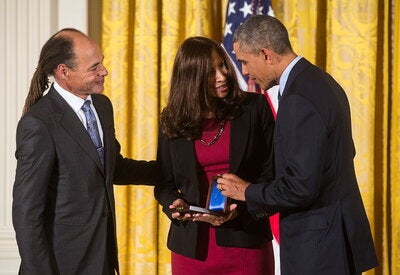
Blackwell received twelve honorary Doctorate of Science degrees over the course of his career; University of Illinois (66), Michigan State University (69), Southern Illinois University (71), Carnegie-Mellon University (80), National University of Lesotho (87), Amherst College, Harvard University (88), Howard University, Yale University, University of Warwick (90), Syracuse University (91), and The University of Southern California (92). Blackwell would go on to hold many notable leadership roles throughout his career, including: vice president of the American Mathematical Society from 1968-71; president of the International Association for Statistics in the Physical Sciences in 1973; vice president of the International Statistical Institute from 1975-78; elected Honorary Fellow of the royal Statistical Society in 1976; and vice president of the American Statistical Association in 1978. In 1979, Blackwell received the John von Neumann Theory Prize, named after one of Blackwell’s earliest professional mentors. Blackwell received this award for his work in Markovian decision processes, and his contributions in probability theory, mathematical statistics, and game theory.
In October of 2014, then U.S. President, Barack Obama announced the recipients of the 2014 National Medal of Science award. Blackwell posthumously received the country’s highest distinction for contributions to scientific research and for his work in mathematics and statistics (Kehoe, 2015). It was also in 2014 that the first Blackwell Lecture to honor David Blackwell for his contributions to statistics and overcoming adversity was held by the Institute of Mathematical Statistics (Bickel, 2012).
His work on game theory, the renewal theorem, dynamic programming, the Rao-Blackwell theorem, comparison of experiments – which he founded – is all just a small testament to his many contributions to the science of mathematics and statistics. However, with all of his contributions to the world, his numerous published papers and books, his leadership roles, and his awards and honors, Blackwell was most proud of his greatest achievement, his family.
“The best thing I ever did in life was to get married to my wife,” – Blackwell (Agwu, Smith, & Barry, 2003).
Ann Madison and David Blackwell wed on December 27, 1944 and proceeded to have eight children over the course of their lives together.
David H. Blackwell died on July 8, 2010 at the age of 91.
Aaron Thompson 7/17/2020
Bibliography
Agwu, N., Smith, L., & Barry, A. (2003). Dr. David Harold Blackwell, African-American Pioneer. Mathmeatics Magaize 76, 3-14.
Albers, D. (2008). Mathematical People: Profiles and Interviews. In D. J. Albers, & G. L. Alexanderson, Mathematical People: Profiles and Interviews Second Edition (pp. 15-27). Wellesley: A K Peters, Ltd.
Bickel, P. (2012, December 12). Blackwell Lecture. Retrieved from Institute of Mathematical Statistics: https://imstat.org/2012/12/19/blackwell-lecture/
Cattau, D. (2010). The University of Illinois Alumni Association – Illinois Alumni Magazine. Retrieved from Centralia High School Alumni Association: http://www.chsalumniassociation.org/alumawards/2010/Illinois%20Alumni%20Magazine.pdf
Grimes, William. (2010, July 17). David Blackwell, Scholar of Probability, Dies at 91. Retrieved from The New York Times: https://www.nytimes.com/2010/07/17/education/17blackwell.html
Hunter, M. (2010, July 7). David Harold Blackwell (1919-2010). Retrieved from Black Past: https://www.blackpast.org/african-american-history/blackwell-david-harold-1919-2010/
Kehoe, E. (2015, January). Blackwell, Chorin, Kailath Awarded National Medal of Science. Retrieved from American Mathematical Society (AMS): http://www.ams.org/notices/201501/rnoti-p51.pdf
Krantz, S. (2005). Mathematical Apocrypha Redux: More Stories and Anecdotes of Mathematicians and the Mathematical. Cambridge University Press.
St. Louis Post-Dispatch. (2010, July 14). David Blackwell fought racism; became world-famous statistician. Retrieved from St. Louis Post-Dispatch: https://www.stltoday.com/news/local/obituaries/article_8ea41058-5f35-5afa-9c3a-007200c5c179.html